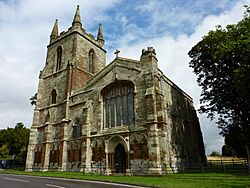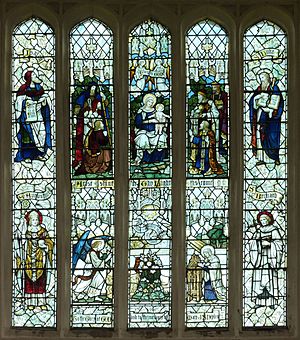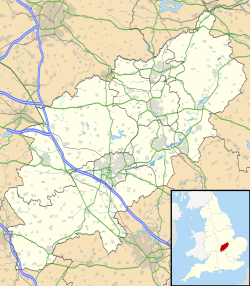Canons Ashby Priory facts for kids

West front of the priory church of St Mary
|
|
| Monastery information | |
|---|---|
| Order | Augustinian |
| Established | by 1151 |
| Disestablished | 1535 |
| People | |
| Founder(s) | Stephen la Leye |
| Architecture | |
| Heritage designation | Grade II* listed |
| Designated date | 18 January 1963 |
| Site | |
| Location | Canons Ashby, Northamptonshire, England |
| Coordinates | 52°08′59″N 1°09′21″W / 52.1496°N 1.1558°W |
| Visible remains | priory church |
Canons Ashby Priory was an old monastery in Canons Ashby, Northamptonshire, England. It was home to a group of Augustinian monks. A priory is a type of monastery, a place where monks or nuns live and pray together.
History of Canons Ashby Priory
The priory was started by a man named Stephen la Leye. This happened between the years 1147 and 1151. At that time, King Henry II was the ruler of England. The priory was built south of where the church stands today.

In 1253, the Augustinian monks were given permission to dig a channel called the Norwell. This channel, which still exists today, brought water to the priory. It helped the monks with their daily needs.
The Priory Changes Hands
Around 1537, a big change happened across England. This was called the Dissolution of the Monasteries. During this time, King Henry VIII closed down many monasteries. The King then gave Canons Ashby Priory and its lands to Sir Francis Bryan. He was a close friend of King Henry VIII.
Sir Francis Bryan owned the priory for only about a year. In 1538, he sold it to Sir John Cope. Sir John was a rich lawyer from Banbury. Later, the property came into the hands of the Dryden family. John Dryden extended the buildings. These became the first parts of what is now Canons Ashby House.
What Remains Today
Part of the original priory still stands. The Church of England parish church of St Mary was built around 1250. This church, along with Canons Ashby House, is now looked after by the National Trust. The National Trust is a charity that protects historic places and natural beauty in England.
The size of the priory can be seen by its other buildings. These spread out over a large area of the countryside nearby. For example, parts of the priory's old guest house, called a hospitalium, can still be found. They are now part of the church in Maidford, which is about 5 miles away.
 | William L. Dawson |
 | W. E. B. Du Bois |
 | Harry Belafonte |


